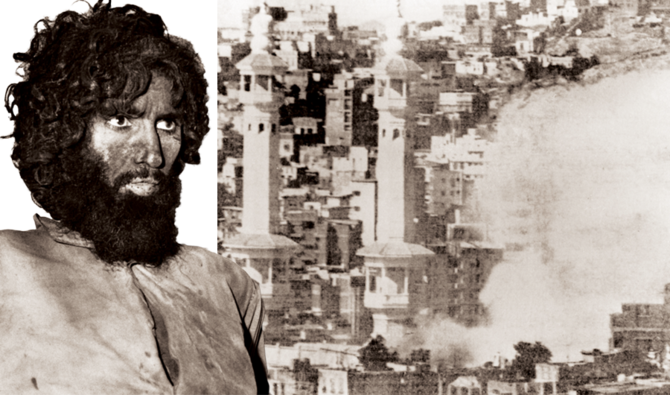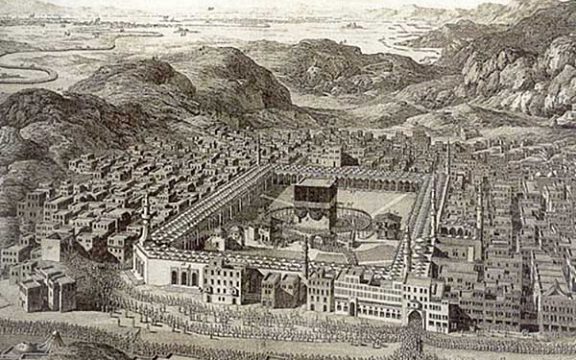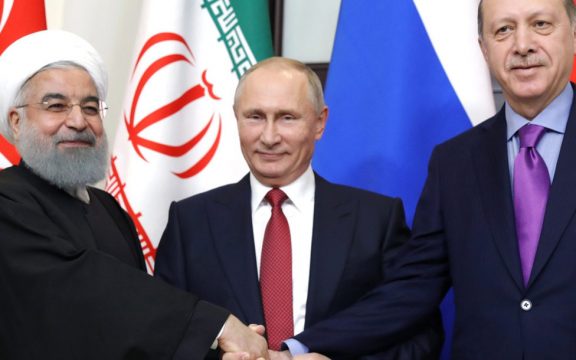Kudeta Mekkah (Mecca’s Coup) Unfolded History, is a book that tells stories about the investigative reports of a journalist who tried to trace a tragic event which not many people know. It is said that not many people know the real situation since the incident occurred in a Saudi Arabia, a restrictive kingdom, in the center of the city which became its most important icon. The incident occurred in the city of Mecca, the holy city which all Muslims aim to visit.
The incident was sabotage of Masjidil Haram in 1979. That year, a former royal soldier named Juhayman Al-Utaibi brought a number of armed men to block Masjidil Haram. Hundreds of people were performing worship in the mosque when the incident took place. Some were Indonesian citizens. What was Juhayman’s goal exactly? This is rather unique.
Juhayman believed that his best friend, Muhammad bin Abdullah, was the promised Imam Mahdi. His characteristics are mentioned in the hadith. He would appear before the appearance of the Dajjal. And the bai’ah takes place in front of the Kaaba, at Masjidil Haram. Well, the action was to realize the prophecy prediction.
How Juhayman came to that understanding? It is a long story, thus the author of this book traced far back. Even to the extent of the establishment of the kingdom of Saudi Arabia itself. In short, the establishment of the kingdom of Saudi Arabia is in the context of the national revival of the Arab nation. Well, many times the attempted resistance against the government of the Ottoman Empire failed. Eventually, they formed a special elite unit called Al-Ikhwan (read Hamid Algar’s book, Wahhabism, to know more about this unit).
This is not the Ikhwanul Muslimin which comes from Egypt. The Al-Ikhwan unit is the most militant and brutal unit among the Najd royal army, east side of the Arabian Peninsula. The success in mastering the Hijaz region, the western part of the Arabian Peninsula which contained the two holy cities of Mecca and Medina in 1922, cannot be separated from this special unit.
They did not hesitate to slaughter Muslims whom they believed were enemies due to the different perspective. Among the Najd royal army units, this unit was the most loyal to Wahhabi teachings. After successfully forming the state of Saudi Arabia in 1932, this unit was disbanded. But unfortunately, this unit is not easy to disperse. Even if it is successful, the ideology that is too firmly planted in the minds of its members is hard to get rid of. That’s right, the tribes that were members of this unit have been accommodated in the royal security guard unit. But some of them still hold firmly the classic Wahhabism doctrine against fellow Muslims.
In fact, these theologies are a legacy of a revolutionary attitude against Muslim Ottoman of Turks. In order for the motivation of the war to be strong, there is no moral burden, the troops must be convinced that what they were facing are infidels who “worship” grave whom must be exterminated. They are more infidel now than the infidels in the jahiliyah era.
When the kingdom was established, the country needs stability. Religious moderation was developed to support the modernization agenda developed by the kingdom. This is where the dilemma occurs. The heroes must accept that they were “betrayed” by their leaders. As it turned out, the leaders were cooperating with foreigners, bringing yet another pagan foreign culture into their country. The nation of Saudi Arabia is experiencing modernization.
Many religious figures had launched scathing criticisms against the kingdom. One of the criticisms is the entry of television which is full of lies and immorality. Women are free to come out with open clothes. In fact, a special school was opened for women who were indicated to teach Western ways of life. And what was most disturbing was the entry of American troops into the sacred Arabian Peninsula. In fact, the Prophet Muhammad had bequeathed to expel Jews and Christians from the peninsula. The most vocal figure was Sheikh ibn Baz.
The kingdom accommodated by appointing the Sheikh as head of royal religious affairs. Criticism decreased since that decision. But radicalized young people have grown. Mainly, from among the tribal families who used to join the revolutionary war against the Ottoman Turks heroically and patriotically. The young man, and many other youths, were nervous about seeing changes in Saudi Arabia that were so quick to accept Western culture.
The feeling of being threatened greatly affected the way he thinks. The existence of American troops with their bases and the victory of the Zionists of Israel against the Arab nations, made him feel Muslim, or even Islam itself was surrounded from all directions. By his united enemies. The spearhead of the enemy’s weapons has now even entered his country through the spread of television that displays various portraits of western life. Juhayman felt this.
Hope then arisen after he got the prophecy of the promised Imam Mahdi. He will come when the people were surrounded. He found that the Imam Mahdi must have come. He was deep in the traditional discourse about Mahdiism. He finally found the predicted figure. He invited his followers to fight for the imitation of imams so that they would soon have broader Muslim support, and in the end, of course, ended their feeling of being threatened by subverting the power that coalesced with the foreign power.
Followers from Egypt, Yemen, Emirates and others supported. They want to realize the prediction. According to the hadith, Mahdi’s supporters will be pursued by the enemy. But God protects by sinking enemies into the ground. They interpreted that their efforts to pledge allegiance to the Mahdi in front of the Kaaba would surely be hindered by the enemy. Therefore, they prepared weapons. Juhaiman was a former military. He knew where and where to get weapons. They succeeded. Before doing that, they had a lot of discussions with Sheikh Bin Baz. But they got no responses that can be expected.
They launched sabotage of Masjidil Haram, in the morning, when many pilgrims were worshiping inside the mosque, which was being built by the Bin Laden’s family construction company. Hundreds or even thousands of worshipers did not immediately understand, what exactly happened. Why were there so many people carrying firearms in the holy area that are forbidden to carry such weapons? Those inside were confused, especially the people outside the mosque.
The authorities themselves had not yet realized that sabotage has taken place. Even up to a week the mosque was held hostage, there was no clarity on what was happening. Before it was finally revealed, Saudi security forces began to respond. But Juhayman’s forces were prepared with sufficient strategy, ammunition and logistics. Several units of government forces tried to enter, but were easily hit with bullets. Until two Sunday, government forces had not succeeded in conquering Masjidil Haram. US, UK and Franch were offering help.
Apparently, the most difficult thing was not about attacking the defectors. But about permitting to religious leaders. Shaykh Bin Baz sat together with the cleric until he had to discuss many times whether or not he is allowed attack Masjidil Haram. Until finally the permit was out, the royal party which received an offer of assistance from France, had to face a new problem. The French soldiers were non-Muslims who were actually forbidden from entering Mecca. The kingdom also tried to cover up this cooperation agreement. Royal security was clearly unable to handle on its own. Finally, the French army only provided brief training and with sophisticated weapons for the royal army. They were trained in Taif, a cool area near Mecca. The latest weapons and techniques were learned quickly. The French agents only watched from afar.
Sometimes later Masjidil Haram was successfully occupied. Juhayman and his flock were captured or executed. Before that, leaders in the world, including Ayatullah from Iran, strongly condemned the acts of sabotage. Even though it was extinguished, it turned out that Juhayman’s ideology had been spread to a wider area. Juhayman has written many things about his thoughts. His teachings were received by the leader of the Jamaah Islamiyah in Egypt who was still Aiman Azzawahiri’s brother. The core of his teachings is the rejection of the sovereignty of Muslim rulers, especially the kingdom of Saudi Arabia. Various arguments were put forward in the book entitled Juhaiman’s Rasa’il which can now be freely accessed on the internet. This treatise was successfully printed widely in Qatar.
One who was inspired and became an important figure was Abu Muhammad Al-Maqdisi. Continuing Juhayman’s argument, the Kingdom of Saudi Arabia has abandoned the teachings of Sheikh Muhammad bin Abdul Wahhab. To get the teachings of Ibn Abdul Wahhab, as Juhayman did, one must read his books and the books written by his students. All have been printed and widely distributed. But not many people want to practice it, including senior Islamic scholars in Saudi Arabia. They even make interpretations that violate the wishes of its writers just to support the ruling regime.
On the other hand, there were many young men in Saudi who have been exposed. Maybe not by Juhayman’s thoughts, but by thoughts that were still in the same spectrum as those who feel dissatisfied with the kingdom. They call themselves Shahwah Islamiyah, which is more or less inspired by their teachers from the Muslim brotherhood. Osama bin Laden, student of Muhammad Qutb was one of the young men. These young people with a burning Islamic spirit can be a problem for the kingdom. However, the Afghanistan war became a way out.
Sheikh bin Baz appealed to Muslim youths to depart for jihad against the Soviet Union, the anti-gods who sought to occupy Muslim lands. Bin Baz and the kingdom, of course with their strategic alliance, America and Pakistan, made the way wide open. Spiritual moral support, money and weapons. However, this step only delayed the massive flood of radicalism within the country, and encouraged the creation of a more trained and global scale group. Al Qaeda. Started by Abdullah Azzam, Osama bin Laden and Aiman Azzawahiri. The most traumatic traces were 9/11 and terror networks around the world since the 2000s.
Abu Mus’ab Azzarqawi, a student of Abu Muhammad Al-Maqdisi inspired by Juhaiman, joined Osama, founded the Al Qaeda, Iraqi Branch (AQI), then the Jamaah Tauhid Wal Jihad in Iraq. Simultaneously with the American invasion of the country in 2003. Before joining Saddam Husain’s supporters and forming the organization of the Islamic State of Iraq (NII). In 2012, along with the opening of the Syrian war, the group changed its name to the Islamic countries of Iraq and Syria (NIIS). This organization has almost become a country with all its devices. A country that wants to purely apply the teachings of Islam, using the ideology that was once used by the kingdom of Saudi Arabia. But this attempt failed miserably.
Like its predecessor, the characters were dead. But that ideology was inherited. The ideology of Juhaiman-Maqdisi-Zarqawi in Tauhid Wal Jihad has been spread on the internet. Translated into several languages. Including Indonesian. The most productive translator of Maqdisi thought into Indonesian is a figure named Abu Sulaiman Al-Arkhabili.
The author of this book displays the “missing link” genealogy of “al-Ikhwan” thought in the past, the days of the formation of the Saudi state, with the theologians of “monotheism and jihad” today. Ideology and brutality are identical. Modernization in Saudi Arabia, as we see it today, is being intensified by the crown prince, may be in conflict with the interests of conservatives, such as in the era of King Faisal and King Khaled. And it is not impossible to give birth to neo-Juhayman. The story might never end. If its strategic interests are against extreme interpretations aiming for instability, then Sunni, moderate Wahhabis and liberal Muslims may have the common enemy.
![Islami[dot]co](https://en.islami.co/wp-content/themes/jambualas/images/logo.png)


